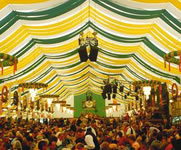Other highlights
Contact
Lübeck und Travemünde Marketing GmbH
Holstentorplatz 1
23552 Lübeck
Email:
pauschalen@luebeck-tourismu...
Internet:
www.luebeck-tourism.de
Holstentorplatz 1
23552 Lübeck
Email:
pauschalen@luebeck-tourismu...
Internet:
www.luebeck-tourism.de
Contact
German Convention Bureau
Münchener Straße 48
60329 Frankfurt am Main
Email:
info@gcb.de
Internet:
www.gcb.de
Münchener Straße 48
60329 Frankfurt am Main
Email:
info@gcb.de
Internet:
www.gcb.de
Museums

Lübeck's Castle Monastery was built by Dominican monks in 1229. Its reputation as the most important medieval abbey in northern Germany is in no small part due to its well preserved wall paintings. In the old confessional building, three floors of historical exhibits paint a picture of everyday medieval life in Lübeck. Notable objects include a typical local pottery jug, and there is even a reconstruction of an archaeological dig. Take delight in authentic children's toys and wince at the grim tools of the executioner, who was also tasked with amputations. In the Middle Ages, Lübeck was known as the Queen of the Hanseatic League. While the museum focuses mainly on the town's heyday, visitors can also learn about life in Lübeck during the Stone and Bronze Ages. Closed Mondays from April to September, and Saturdays, Sundays and Mondays from October to March.
» www.luebeck-tourismus.de
Theatre puppets take centre stage in this museum in Lübeck's old town. The collection, which is drawn from three centuries and covers an area of 600m², includes hand puppets, marionettes, rod puppets, shadow puppets and ventriloquist's dummies. It also showcases numerous other puppets from Europe, Asia and Africa. Posters, leaflets, entrance tickets, trading licences of established families of players, complete stages, scenery, props, tools – everything and anything to do with the enchanting world of puppet theatre is on display here. The museum is also home to an extensive collection of organs, musical instruments and street ballad display panels. Open every day, closed on Mondays November to March.
» www.figurentheater-luebeck.de
Museum of Ethnology The Museum of Ethnology, part of the Museum of Art and Cultural History, has been located in the 16th century armoury next to Lübeck Cathedral since 1984. Its approx. 30,000 exhibits, gathered from every corner of the globe, range from religious objects and artworks to simple everyday items. The museum chronicles the past and present lives of people from outside Europe – with a focus on the Near and Middle East, East Asia, Africa, Central and South America and the South Pacific. A highlight of the collection is the Lübeck Apothecary Mummy, a relic from ancient Egypt. The opulence of its amulet jewellery, which is still present under the bandages, is unparalleled in a museum of this kind. Closed on Mondays, guided tours on request.
» www.vkhl.de
Buddenbrooks House Literary Museum – Thomas Mann Centre The Buddenbrooks House, which provides the setting for Thomas Mann's famous novel, now contains a museum that has served as a tribute to the Mann family's literary legacy since 1993. Based in Lübeck's old town, the permanent exhibition – comprising letters, commentaries and first editions – gives an insight into the life and work of the writers Thomas and Heinrich Mann. Also on display are photos and other contemporary documents, including Thomas Mann's certificate for winning the Nobel Prize for Literature in 1929. The centre regularly hosts special exhibitions focusing on the various members of the Mann family as well as other 20th century writers. Events held in original settings across the town really help bring the novels to life. Open all year round. Guided tours available on request.
» www.buddenbrookhaus.de
Since 1999, Lübeck's premier producer of marzipan offers visitors a small marzipan museum in addition to its well-established café. In this marzipan paradise they can learn all about the legend of how marzipan was invented and the history of the House of Niederegger. The Marzipan Museum's most impressive exhibits are twelve life-size marzipan figures, representations of famous Lübeck residents, from Hans Jakob Christoffel von Grimmelshausen to Thomas Mann and Wolfgang Joop. Guided tours available.
» www.niederegger.de/en
St. Anne's Museum in Lübeck is in the late-Gothic Abbey of St. Anne, which was built for Augustinian nuns between 1504 and 1515. A museum for displaced ecclesiastical treasures was founded there between 1912 and 1914 with an emphasis on sacred art. The Gothic rooms of the former abbey are the backdrop for Germany's most important collection of fully preserved, medieval carved altarpieces in the north German style. There are 15th and 16th century Dutch religious paintings including Hans Memling's outstanding Passion altar of 1491. The collection also includes exquisite liturgical vestments and artefacts from the Middle Ages. The main features of architectural interest are a complete suite of Gothic rooms and the cloister, the calefactory, the lay refectory, the nuns’ refectory, the refectory, the chapter hall and the sacristy. Closed on Mondays. Guided tours on a regular basis.
» www.luebeck-tourismus.de
Lip-smacking delights await at Lübeck's Marzipan Land. Don't worry if you haven't got a sweet tooth though – there's lots to learn about the history of marzipan, how it's made and the many different styles and flavours. Art lovers won't be alone in marvelling at a marzipan reproduction of da Vinci's Last Supper. It measures 20m² and weighs in at one and a half tonnes. There's also a marzipan violin that can actually be played, complete with edible sheet music! A dress consisting of 25,000 marzipan sweets has even made it into the Guinness Book of Records. There's not much here that isn't marzipan – brightly coloured frogs, red and white lighthouses, succulent-looking shrimps, German sausages and a mediterranean fruit cart packed with lemons, oranges, strawberries and melons. Visitors are also welcome to create their own marzipan models. Open Monday to Friday.
» www.marzipanland.de
Travel Planner
Select an option...



